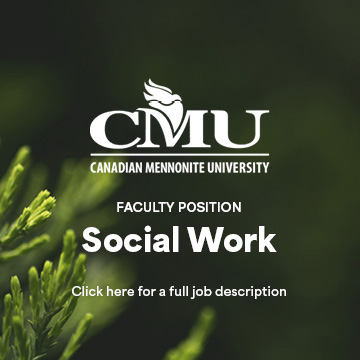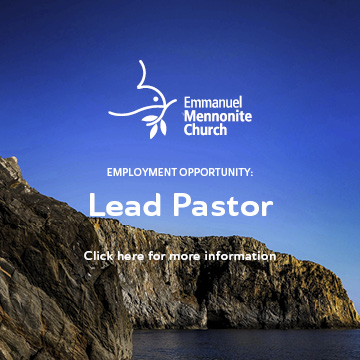I was sitting in a theology class during my first year at Canadian Mennonite University (CMU) in Winnipeg, when the question first dawned on me: Where does my professor go to church? Where did any of my professors go to church?
What kind of members were they in their congregations, I wondered. Did they serve in teaching roles? Did they gave lectures similar to those in the classroom, or did they preach sermons that drew on the rich theological tradition that had already begun to captivate me?
What might congregations look like if such academic theological work was not only common, but accepted and pursued as a vital form of Christian faith expression and inquiry? I began to dream of an academic church, and as I learned more about the churches my professors and other students attended I soon discovered that academic churches do exist, even among Mennonites. Not as congregations solely comprised of theology professors, but as places of worship that include and value academic reflection and inquiry on questions of faith.
I never noticed the absence of academic theology in my home congregation prior to my encounters with it at CMU, but it was becoming an important part of my own identity and my understanding of Christianity. Much to my chagrin, this soon revealed itself as a gaping hole among several Mennonite congregations with which I had worshipped.
I have found two main reasons for the absence of academic theology in Mennonite churches:
- Academic theology is considered too abstract and conceptually complex that it is irrelevant for the worshipping community.
- Its critical and authoritative claims run up against the official theologies of the church and it becomes a perpetual source of tension and conflict.
Both arguments express a negative and suspicious posture towards academic theology.
The developments of these attitudes toward academic theology are, of course, far more complex and can vary significantly between congregations, and from person to person. I simply want to draw attention to some of the dynamics at play and suggest a way forward by thinking about the roles different sorts of theology play in the church and the academy.
Nicholas Healy is a Catholic theologian whose work I have found helpful in articulating various kinds of theological reflection in Christianity. Healy distinguishes between four sorts of theological inquiry: official, ordinary, academic and churchly.
Official theology refers to summary statements that a denomination makes on its understanding of Christianity. For Mennonites, this could include documents such as the Confession of Faith in a Mennonite Perspective, material produced by the national church, writings of the early Anabaptists, or reconciliatory documents between Mennonites and Lutherans, to name a few.
What characterizes official theology is its authoritative purpose. It seeks to articulate and affirm the claims of the denomination. In the Mennonite church, official theology is most commonly produced by the national and area churches, as well as pastoral teams and council members of individual congregations.
Ordinary theology, by contrast, is the everyday theological reflection of lay Christians. By calling it ordinary, Healy does not suggest that it is simple or lesser. What constitutes ordinary theology is that it is reflection done by ordinary Christians on life experiences. Moreover, as Healy states, these ordinary theologians are vital to Christianity.
In his article “What is systematic theology?” in the January 2009 issue of the International Journal of Systematic Theology, he writes: “Some church people may be relatively uneducated, but a large portion will bring knowledge and skills in areas largely unfamiliar to theologians and church authorities to their thinking about Christianity.”
The third and fourth categories—academic and church theology—name two locations where theological reflection occurs. Official and ordinary theologies can take place in both settings. The historical relationship between the university and church is somewhat complex. Prior to the 16th-century Reformations, theologians and clergy were one and the same. Universities were church-instituted and their faculty also served in various ministerial roles. In the wake of the Reformations, with their anti-clerical sentiments and a turn to individual scriptural interpretation, rationalism emerged as a viable alternative to orthodoxy.
Universities were not insulated from the effects of an increasing commitment to rationalism, and many sought to distance themselves from theological conflicts between church authorities. This paved the way for modern biblical scholarship, in which one could study and analyze biblical texts as one would any other literary text—that is, apart from any commitment to the truth it claims. This history, in admittedly broad brush strokes, accounts for some of the existing tensions between academic and church theology.
Ultimately, Healy believes that the task at hand is neither to decide between church and academy, nor to devise some sort of compromise between the two. Rather, he contends in the same article that “systematic theology must necessarily be a bit of an outsider in both the church and the university if it is to contribute to the quest for greater understanding of the Christian faith.”
For Healy, academic theology has a unique function in relation to the church as well as to official and ordinary theologies. It is worth quoting him at length here (emphasis added by me):
“For unlike official theology, its concern is not to get its productions as correct as can be in order to set forth the communally normative path for the faithful. It cannot be merely playful either, of course, since it aims, in its own way, to bring further light to the truth about reality as a whole as it relates to God. It does so, however, by negotiating critically, imaginatively and constructively with ordinary theologies as well as with official theology, and so must engage with the multitude of human productions outside as much as inside the sphere of the church. Rather than being normative, it is developmental and experimental. It explores new or forgotten approaches, engages new events, and new or hitherto overlooked resources amongst ordinary theologies and the productions of other university disciplines.”
Healy’s work helps us to reconfigure the church-academy debate from a binary tension to a dynamic and theologically rich relationship between official, ordinary, academic and churchly theologies. For Healy, academic theology can play a vital mediating role between the other three, intertwining them in order to craft its own theological contributions, rather than devising its own positions out of pure reason.
Such a dynamic, service-oriented notion of academic theology certainly bears on my earlier dreams for an academic church. The gift of academic theology is not to enlighten the church with the latest hermeneutical methods and doctrinal elucidations. To be sure, academics serve a teaching role in the church, but we must remember that this teaching takes the form of service. The words of the prophet Isaiah are striking: “The Lord God has given me the tongue of a teacher, that I may know how to sustain the weary with a word. Morning by morning he wakens—wakens my ear to listen as those who are taught” (Isaiah 50:4, NRSV).
While I still get excited about a room full of theologians debating both concrete church issues as well as more conceptual concerns, I have a deep ambivalence toward attempts to engineer a church through a group of academics, on the one hand, or without them, on the other.
Teachers are one part of the body, but the Isaiah passage powerfully recasts how we think of teaching. Here, the role of the academic theologian is to sustain the weary and to listen to the voices of official, ordinary and churchly theologies.
The task of the academic theologian is not to speak from a position of intellectual or theological priority, but to articulate what they hear, to describe what they see, to bring the often conflicting voices together in new and different ways, and thereby reconfigure the relations between official, ordinary, academic and church groups toward healing and reconciliation.




Add new comment
Canadian Mennonite invites comments and encourages constructive discussion about our content. Actual full names (first and last) are required. Comments are moderated and may be edited. They will not appear online until approved and will be posted during business hours. Some comments may be reproduced in print.